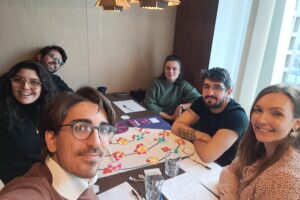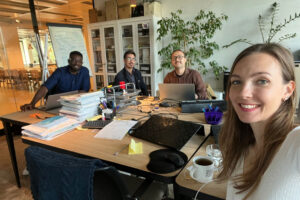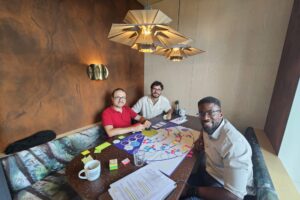
The dimensions in Sheffield
David Soto Oñate
Hi Expliciters! I am David Soto, from the Post-growth Innovation Lab (University of Vigo, Spain). This last summer, I visited the University of Sheffield (UK) to contribute to the project within the Work Package 1. My allocated task was to start the elaboration of the four basic (and extreme) scenarios emerging from the intersection of the two selected dimensions. The determination of these four basic scenarios will be used by the next secondees to create a board game based on the JRC’s Scenario Exploration System.
The dimensions were:
- The acknowledgment of limits to throughput growth: from a society that recognizes ecosystemic limits to throughput to a society that considers no restriction and pursues endless growth.
- The governance approach: from top-down centralized governance to bottom-up decentralized governance.
The combination of these two dimensions would produce four extreme scenarios:
- Unrestricted growth under top-down centralized governance
- Unrestricted growth under bottom-up decentralized governance
- Restricted growth under top-down centralized governance
- Restricted growth under bottom-up decentralized governance
My main aim was to define general implications that could represent the wide range of possible societies occurring at the edges. I mean, what general features would be present in any potential scenario yielded at the extremes of this intersection. Attempting to imagine all the potential scenarios with only two dimensions was a very overwhelming task. The consideration of any important variable that could have diverse shapes, like property rights allocation, cultural backgrounds, or socio-technical imaginaries, would result in very different outcomes. However, the simplicity requirement of the board game prevented the inclusion of more dimensions.
My first conversation with Andrea Genovese and Ben Lowe was very enlightening. They had already attempted to develop potential scenarios for another project (ReTraCE) and shared with me a very useful report. In their report, they had introduced many other dimensions that helped them organize, envision, and describe the potential scenarios more elegantly. That definitely relieved some of my anxiety.
Nevertheless, the two-dimensional scenario task needed to be performed. I did my best to define those generalizations. My long conversations with Tommaso Calzorali and Ben Lowe helped me a lot in clearing my mind and I have to say that I was not very unsatisfied with the result.
Beyond my specific task, in this month I met wonderful researchers from the Management School, I enjoyed the stimulating and vibrant social atmosphere of Sheffield city and even played a football match!
Anyways, my participation in the Explicit project did not end with my visit to Sheffield. I participated in subsequent meetings, read my colleagues’ reports, and presented a work of mine in one of the project’s workshops. So, the intellectual life within the project is still very stimulating.


You may also like

Learning by doing

A Hydrologist’s Journey into the Circular Economy

